
Pison is a cosmopolitan genus of wasps within the family Crabronidae. The genus comprises 145 described species, although many species, especially in South America remain undescribed.

Pepsis is a genus of spider wasps belonging to the family Pompilidae.

Ammophila is the type genus of the subfamily Ammophilinae of the hunting wasp family Sphecidae. Ammophila is a large and cosmopolitan genus, with over 200 species, mostly occurring in the warmer regions of all continents apart from Antarctica.

Episyron is a genus of wasps in the family Pompilidae which prey on spiders. Nine species are found in Europe.

The Pompilinae are a subfamily of the spider wasp family, Pompilidae, the species of which lay their eggs on the paralysed bodies of their prey.

Anoplius is a genus of spider wasps in the family Pompilidae, called the blue-black spider wasps.

The Pepsinae are a subfamily of the spider wasp family, Pompilidae, including the tarantula hawks, as well as smaller species.
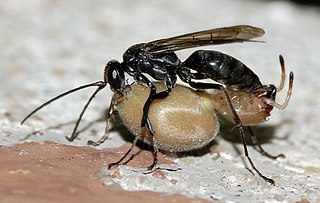
Auplopus is a large genus of spider wasps belonging to the subfamily Pepsinae of the spider wasp family Pompilidae, distributed throughout the world except for Antarctica. Auplopus wasps have the gruesome habit of amputating the legs of their spider prey before transporting it to the nest.
Homonotus sanguinolentus, the bloody spider-hunting wasp is a European species of Pompilid wasp.

Aporus is a genus of spider wasps from the family Pompilidae, they specialise in hunting ground dwelling spiders in their burrows for laying eggs on.
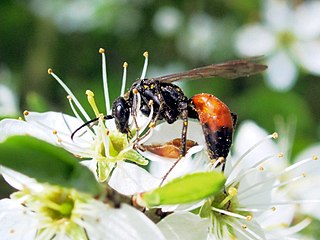
Priocnemis is a genus of pepsine spider wasp containing around 30 species.

Evagetes is a genus of spider wasps from the family Pompilidae. There are 72 described species, of which 58 are found in the Palaearctic region, 11 in the Nearctic region, with a few penetrating to the Afrotropical, Oriental and Neotropic regions. Evagetes wasps are kleptoparasitic on other pompilid wasps, especially the genera Arachnospila, Anoplius, Episyron and Pompilus, digging into their sealed burrows, eating the host egg and replacing it with an egg of its own. Evagetes wasps are characterised by their very short antennae. Most are species are black with the base of the antennae rufous, several Evagetes species are very metallic bluish insects.
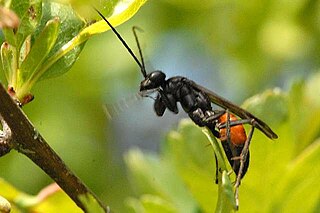
Arachnospila is a predominantly Holarctic genus of spider wasps, with limited representation in montane habitats in Neotropical and Afrotropical regions. They are found in open habitats and at forest edge, the nests may contain more than one cell.
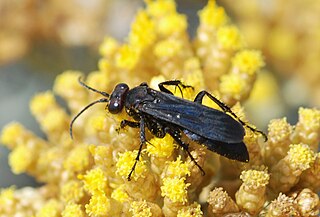
Agenioideus is a genus of spider wasps from the subfamily Pompilinae; the genus occurs in Europe, where 21 species are recorded, eastwards to Japan, in North America, South America, and Australia.

Cyphononyx is a genus of spider hunting wasps in the family Pompilidae.

Batozonellus is a genus of the spider hunting wasps.
Ireangelus is a genus of kleptoparasitic spider wasps from the sub-family Ceropalinae of the family Pompilidae. The genus has a pan tropical distribution, being known from Oriental, Neotropical, Australian, eastern Palearctic, and Madagascan Zoogeographic regions being best represented in the Neotropics. Irenangelus is closely related to the more widespread genus Ceropales, the two genera forming a monophyletic subfamily, Ceropalinae within the Pompilidae. This is regarded as the most basal grouping of the Pompilidae but this view is problematic because of the kleptoparasitic life history of the Ceropalines, it is now considered that they Ceropalines and other pompilids evolved from a common ectoparasitoid ancestor.
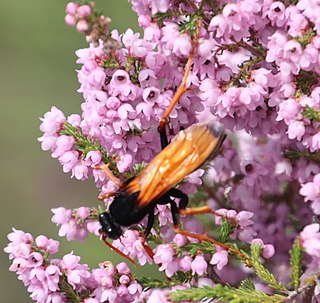
Hemipepsis is a genus of large pepsine spider wasps found throughout the tropics. They are commonly known as tarantula hawks. Hemipepsis wasps are morphologically similar to the related genera Pepsis and Entypus, but distinguishable by the pattern of wing venation. In South Africa 18 plant species from three plant families, the Apocynaceae, Orchidaceae, and Asparagaceae subfamily Scilloideae are pollinated exclusively by Hemipepsis wasps.
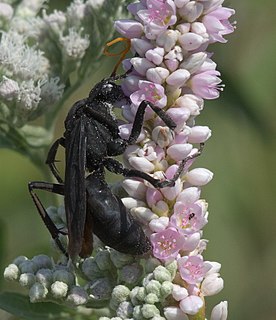
Entypus is a genus of spider wasps in the family Pompilidae. There are at least 40 described species in Entypus.

Pepsini is a tribe of spider wasps in the family Pompilidae.

















